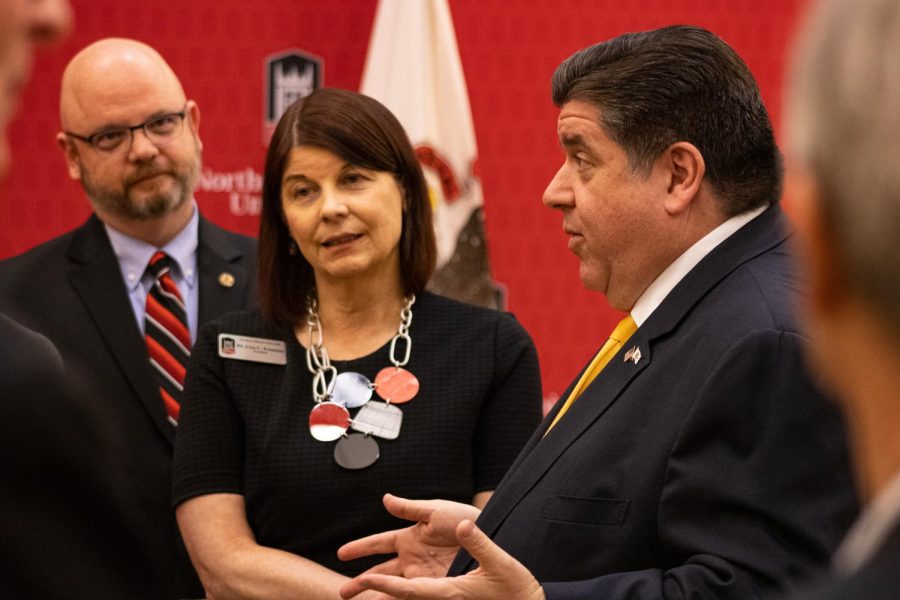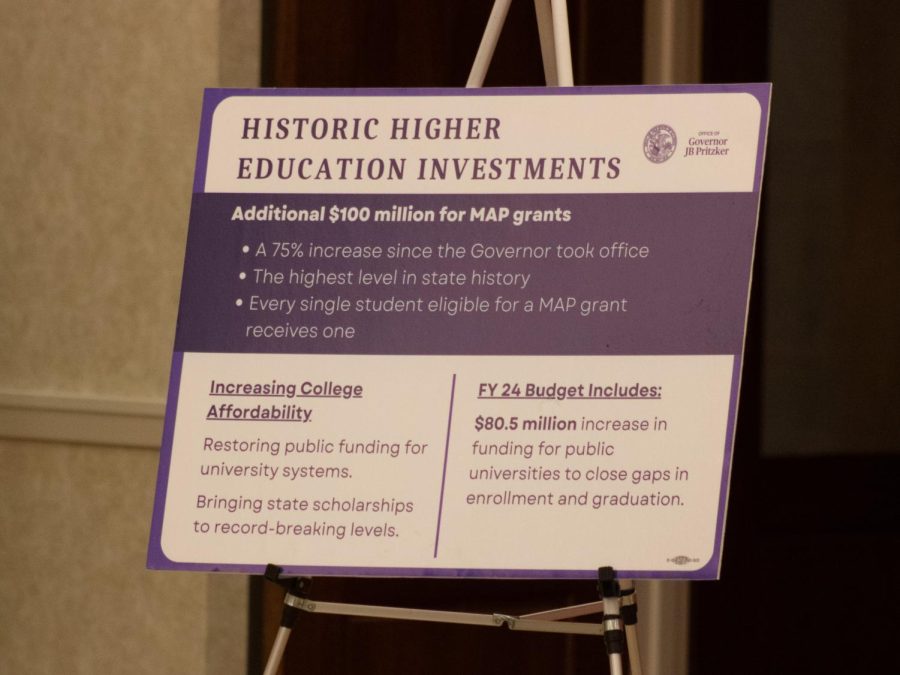Pritzker discusses college funding at NIU
Illinois Representative Jeff Keicher (left), NIU President Lisa Freeman and Illinois Governor J.B. Pritzker in conversation after a press conference Tuesday. During this press conference, Pritzker spoke on college funding and ensuring affordable education for Illinois students. (Sean Reed | Northern Star)
April 4, 2023
Editor’s note: This piece was updated at approximately 3 p.m. on Tuesday to include more information.
DeKALB – With a historic push on higher education, Illinois Gov. J.B. Pritzker emphasized the funding that his proposed fiscal year 2024 budget will bring.
Pritzker spoke at NIU Tuesday about continued investment in Illinois, focusing on higher education. Pritzker was joined by NIU President Lisa Freeman, Illinois State Senator Sue Rezin, Illinois State Representative Lance Yednock, DeKalb Mayor Cohen Barnes and Illinois State Representative Jeff Keicher. Keicher is a member of the Appropriations – Higher Education Committee.
“Four years ago, when I first took office, going to college in Illinois seemed more unaffordable than ever before,” Pritzker said. “Funding for higher education had been cut so badly that out-of-state tuition in other states was more affordable than in-state tuition for Illinois students.”
Pritzker’s proposed plan is to increase state funding for universities and colleges by 7%, totaling a $100 million investment. Pritzker said that prior investments show this increase as worthwhile; and while national enrollment in universities and colleges is down by 2.4%, Illinois enrollment is up by 5%.
Keicher said much of this investment would go to increasing MAP (Monetary Award Program) grants which, according to the Illinois Student Assistance Commission, covers 30% to 50% of tuition costs for Illinois institutions. These costs allow five to six thousand students at NIU to benefit, Keicher said.
Pritzker said actions needed to be taken to make colleges in Illinois more affordable including making historic higher education investments. Actions such as increasing the amount received in a MAP grant to reduce costs for median income families seeking an associate or bachelor’s degree.
With Pritzker was NIU student Brittany Hernandez, a sophomore mathematics education major. Hernandez said growing up in a lower income family meant the financial cost was an obstacle to getting an education that was seemingly impassable. Hernandez said she was able to afford to go to NIU and she said hopefully her three younger siblings will be able to seek higher education as well because of scholarship opportunities and the support of educators.
“I want to encourage them (students) to try to sort of achieve their dream and go past that threshold,” Hernandez said. “For generations to sort of go out and seek the opportunity from the college experience.”
Pritzker said investment efforts in higher education do not stop at making colleges affordable but in making colleges and universities more modern in the 21st century. Improvements to infrastructure are needed to combat the deficit that has occurred through Illinois higher education. Efforts like the Rebuild Illinois Capital Plan which directed $130 million to fund the new Health Informatics Technology Center and Center for Community Sustainability at NIU.
Barnes said that despite NIU being located near the third largest metro area, DeKalb is lacking a commuter rail and is in need of one. Doing so would open up opportunities for both prospective students in Chicago and current NIU students, Barnes said.
Keicher, a member of the Republican party, showed support for Pritzker’s plans in expanding investments in higher education. Despite being on opposite ends of the aisle, both are in agreement this is for Illinois’s future.
“When it comes to providing opportunities for the children in the state of Illinois and the higher institutions, higher education institutions we’re rowing in the exact same direction,” Keicher said.
“The human return on this capital expenditures will be substantial,” Freeman said. “The projects will create jobs that fuel local economies and the modernized facilities will help attract and retain students, faculty and staff critical to Illinois’s future workforce.”
Barnes said these investments go well past the financial budget and into economic development in the City of DeKalb. NIU is the only Illinois university to not have a commuter rail, according to Barnes, despite being located near the third largest metro area. Efforts are being made to approve development on a commuter rail that would allow prospective future students from Chicago to be able to enroll in NIU. Barnes said NIU has been an invaluable ally in this making the probability of it happening all the more liking.
What is also important is retaining people and Barnes said DeKalb has seen investment by major companies like Ferrara, Amazon and Meta. Investments like these will not only benefit the current generation but future ones to come.
“We have had unprecedented economic development happening in the City of DeKalb. Literally billions of dollars are being invested,” Barnes said.




